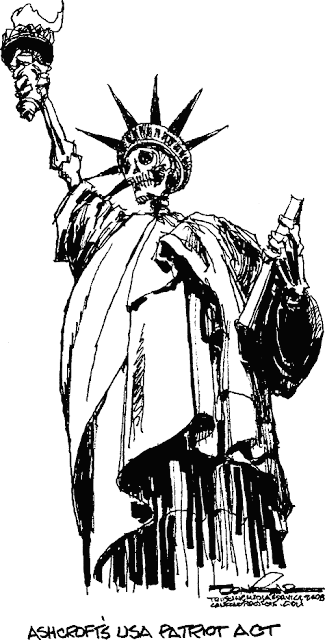I was very saddened to hear of Paul's death on September 4th - happily his art will live on in our hearts and political minds. Paul was a master cartoonist as well as a deft quick sketch artist, something that many artists today lack. He was a grumpy old gruff, ornery and cantankerous, friendly and engaging, the champion of the little guy, an opinionated loudmouth, a quick thinking editorialist and a genuine sweetheart. He was all of this, a liberal artist, respected and loved. His strength was the gestation of a single image that would say it all. Watching him at work was always fun - the precision pencil roughing out the gesture of a victim, with angular and tentative jagged graphite; then the sometime frustration when it didn't meet his vision, the cuss words as he cast it in the trash to begin another. Finally, after getting his painstaking sketch down, the pen applied with masterful ink strokes, thick and thin, was a wonder to behold. In a world full of oatmeal personalities (those without the cojones to take a stance, any stance) Conrad was a refreshing and dedicated strong thinker, his wonderful pen pulled no uncertain punches.
 |
| "I'VE NEVER WORN MAKEUP" |
From the Los Angeles Times-
(Conrad's long time home) -
With an unyielding liberal stance rendered in savage black and white, Conrad both thrilled and infuriated readers for more than 50 years. He won three Pulitzer Prizes, a feat matched by only two other cartoonists in the post- World War II era. Mayors, governors and presidents cringed at the prospect of being on the business end of Conrad's searing pen, while many Southern Californians made him their first stop as they sifted through The Times, the newspaper that was his principal home for nearly 30 years. Just before his death in 2007, the onetime editor of The Times' editorial pages, Anthony Day, worried that the skittish and contracting newspaper industry would no longer support a "genius" like Conrad. "It's easier to not make trouble," Day said, "than to make trouble."
From Tim Rutten-
He was always and everywhere on the side of decency and ordinary men and women. His targets were the self-satisfied powerful, those indifferent to or antagonistic to our common good, and they included presidents -- as in these cartoons -- as well as governors, mayors, popes and corporate executives.
What impressed me, too, was that someone as impassioned as Conrad, a devoted Catholic, came to change his mind about abortion rights issues; he was persuaded – no, he persuaded himself, he once said – that he had "forgot[ten] about the women in this thing."







